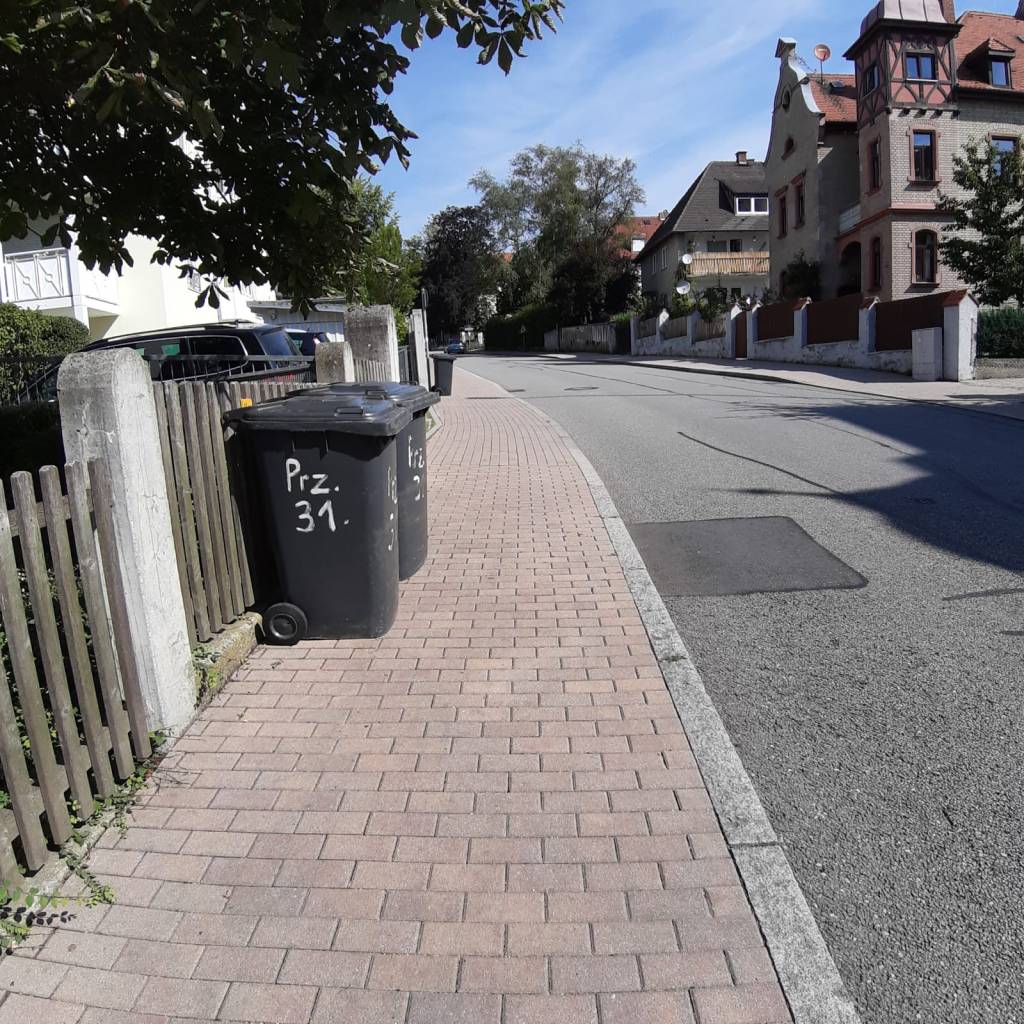Please scroll down for the English version
Hallo!
Uma observação para começarmos esse texto: apesar de estar aqui fazendo doutorado focado nas mudanças climáticas, esse post será escrito com a visão de um cidadão sobre o que vemos e sentimos morando aqui na Alemanha a respeito das preocupações do país e dos seus moradores em relação à sustentabilidade.
A Alemanha é um país com uma grande preocupação nas questões de sustentabilidade e pretende ter 100% da produção de energia elétrica neutra até 2040. O país vem trabalhando duro pra atingir os seus objetivos, e é fácil de perceber isso como leigo, durante os passeios pelo país nas usinas de energia solar e também nas fazendas de geração de energia eólica que são elementos frequentes na paisagem por aqui.
Os alemães também têm um sistema de separação eficiente do lixo, que começa em casa. Todos separam o lixo de papel, o lixo plástico (e aqui soma-se tudo o que possa ser reciclado que não se encaixe como papel), o lixo biológico (restos de comida) e o lixo comum que compreende tudo o que não possa ser reciclado. Cada endereço tem um calendário que informa o dia de coleta e os moradores então colocam o seu lixo na calçada no dia anterior.
Cada tipo de lixo deve ser acondicionado de forma adequada, por exemplo, lixo de papel, não se entrega em sacola plástica, e o lixo biológico ou deve estar acondicionado em sacolas de papel, ou então plástico biodegradável.
Os vidros que não estão na categoria retornável, devem ser descartados separados por cor em estações de coleta espalhadas pela cidade.

Algumas cidades têm o serviço de coleta de resíduos volumosos, onde estão incluídos móveis e eletrodomésticos antigos, nestes dias que ocorrem entre 2 a 3 vezes por ano, os móveis são colocados na calçada e muita gente aproveita para dar uma olhada antes dos caminhões passarem para ver se têm algo interessante.
Aliás, essa cultura de produtos de segunda mão é super bem aceita por aqui, e não falamos apenas dos famosos brechós europeus. Roupas e calçados usados podem ser depositadas em containers localizados em diversos pontos das cidades e que geralmente serão destinadas a organizações como a Cruz Vermelha que organiza as peças e depois faz bazares para vendê-las a preços extremamente baixos.
O Market Place do Facebook e o eBay são ótimos canais para encontrar itens em ótimas condições e preços módicos. Então com um pouco de criatividade é possível fazer uma decoração bacana gastando muito pouco ou quase nada. Para ajudar no transporte das compras grandes existem serviços de táxi para móveis ou você pode alugar carros grandes pagando pelas horas necessárias.

Mas o que nós achamos muito bacana é a cultura que existe em algumas cidades de simplesmente organizar uma caixinha na calçada de casa com os itens que se pretende doar. Nessas caixinhas você encontra tudo o que possa imaginar então é sempre uma boa dar uma olhadinha, para ver o que estão doando.
No nosso caso já encontramos bermuda de marca ainda com a etiqueta, até louça embalada em plástico bolha.

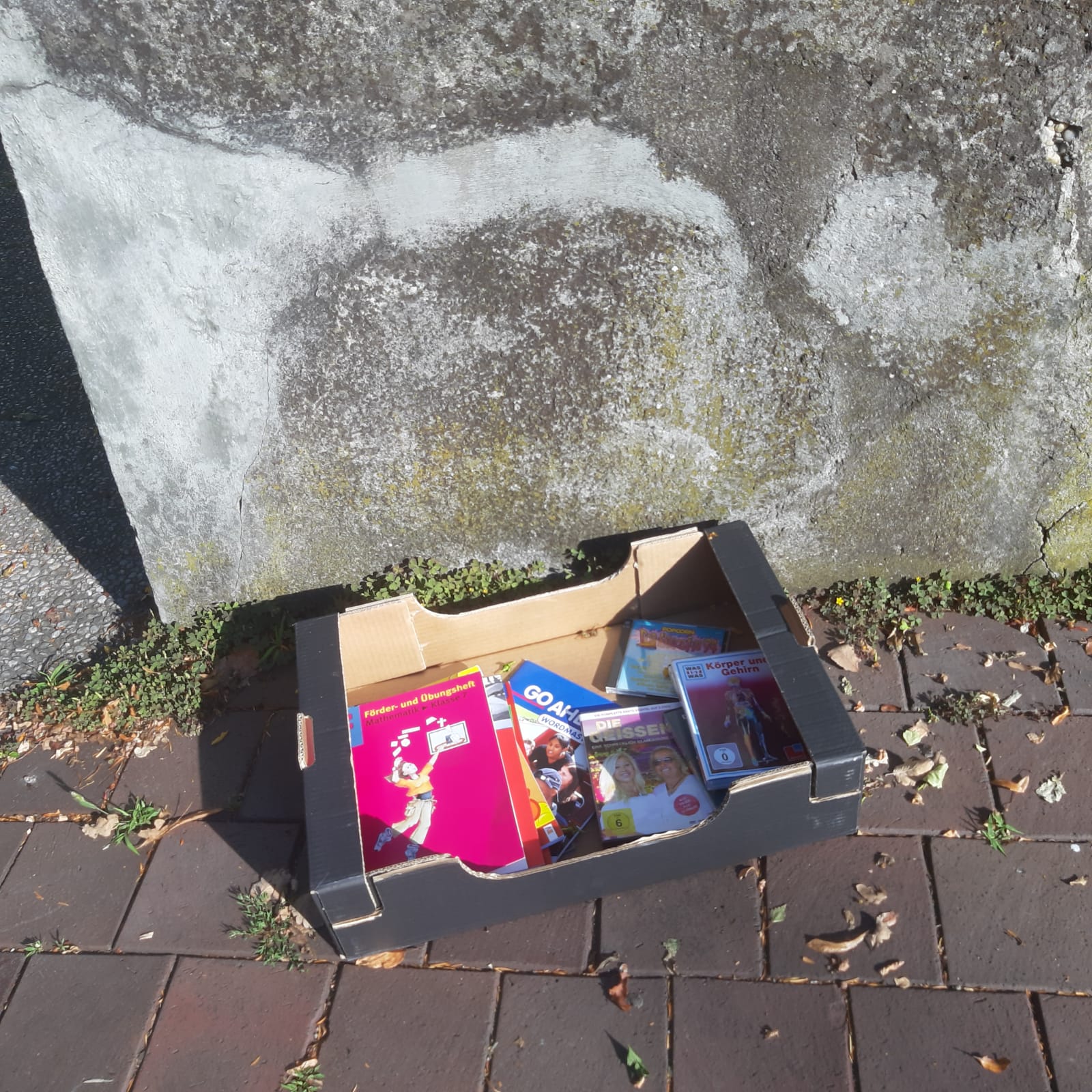
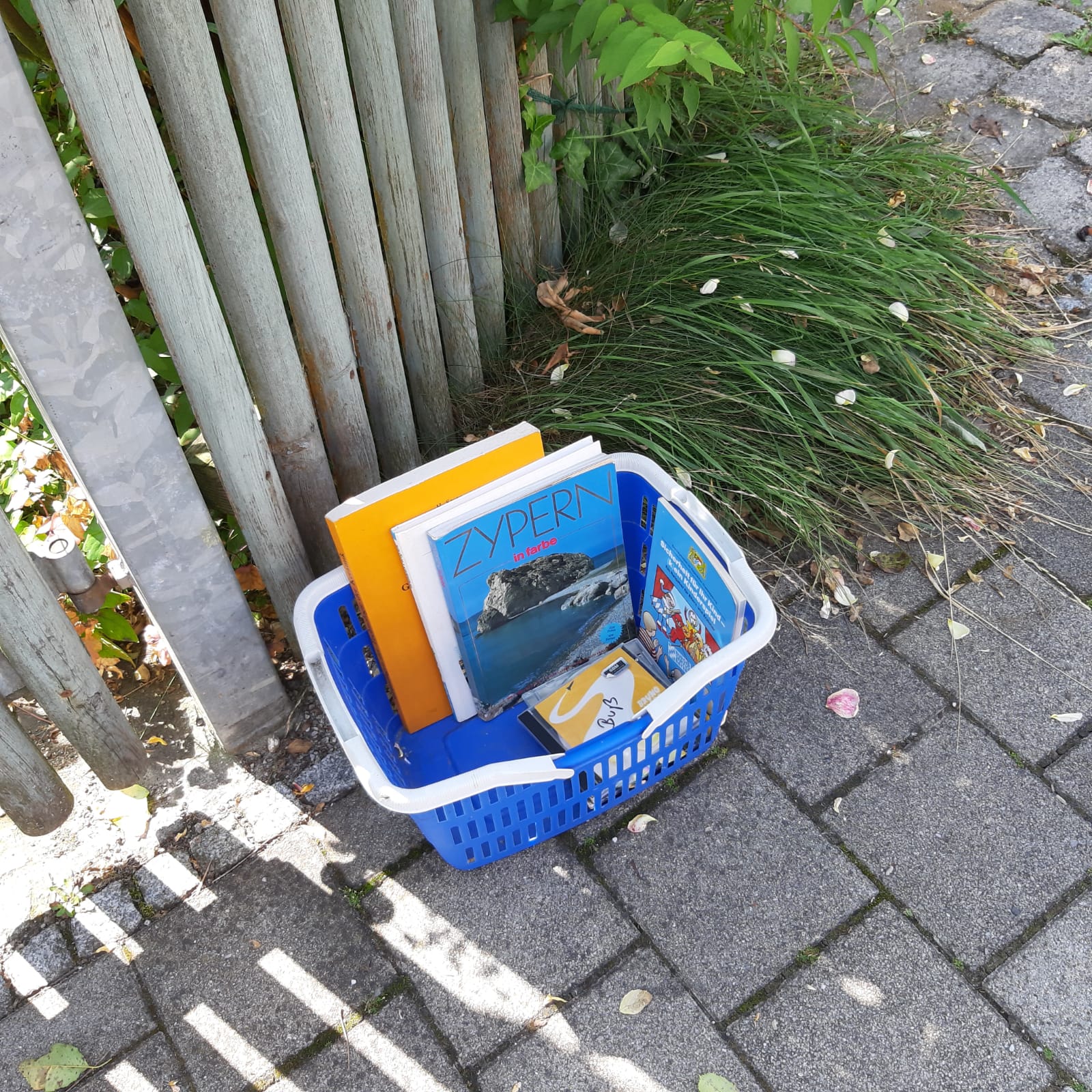
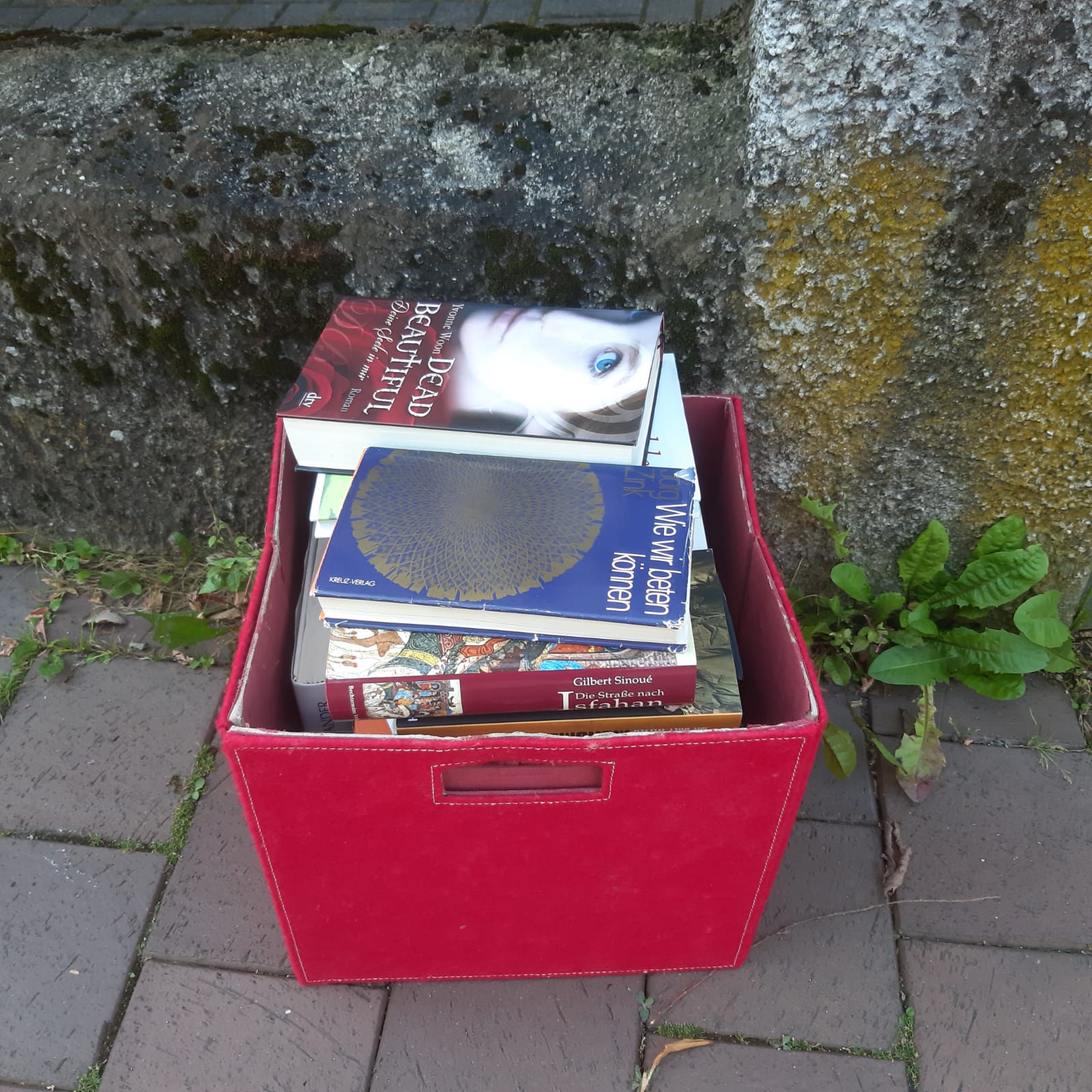
Mas os favoritos nestas caixinhas de doação são os livros, claro que normalmente em alemão, mas procurando bem, é possível achar diversos títulos em inglês.
As embalagens plásticas ainda são bastante frequentes por aqui, mas uma luz no fim do túnel são as lojas que vendem produtos à granel, onde você leva o seu próprio recipiente para a compra e o Pfand que é um tipo de caução que se paga pelas embalagens plásticas de bebida e vidros. Os plásticos variam entre 0,15€ e 0,25€ cada e as garrafas de cerveja variam entre 0,09€ e 0,25€. Muitos mercados têm máquinas onde você faz a devolução das embalagens e recebe um crédito que pode ser utilizado no pagamento da próxima compra ou então revertido em dinheiro no caixa.

Símbolo que indica que a embalagem é retornável com o pagamento do caução 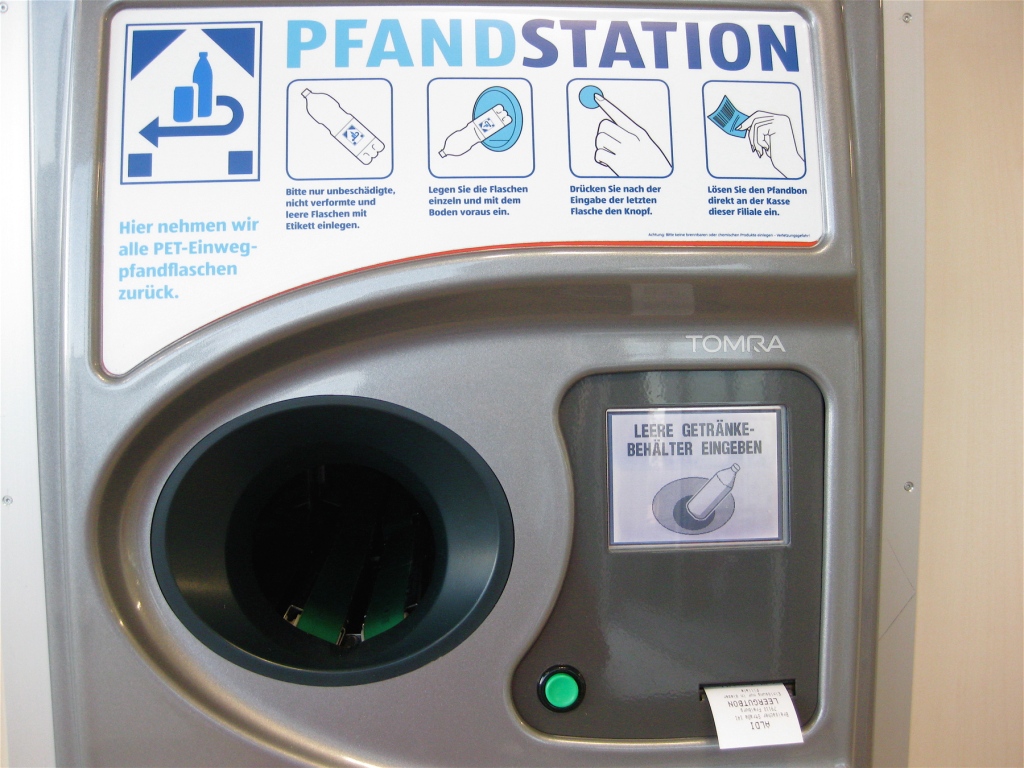
Pfand Machine 
Loja de produtos à granel
Aliás, dificilmente se encontra sacola plástica nos mercados, apenas umas bem fininhas para frutas e legumes, mas que muita gente nem usa, preferem umas de tecido ou então levam os vegetais diretamente ao caixa.
Sacola aqui você leva as suas retornáveis, ou então paga 0,20€ por uma sacola de papel.
E no país de grandes montadoras como Porsche, BMW, Mercedes Benz, Volkswagen… onde se pode dirigir sem limites de velocidades nas Autobahnen, muitas pessoas preferem se deslocar usando meios mais sustentáveis como ônibus, trens e bicicletas. As bicicletas são super utilizadas, com diversas variações, incluindo aí bicicletas elétricas, triciclos e que muitas vezes acoplam trailers para o transporte de crianças e cargas. E as bikes também são aceitas nos trens com o pagamento de um ticket específico, o que favorece o deslocamento de grandes distâncias com meios sustentáveis.

Então acreditamos que um dos melhores exemplos que podemos tirar da cultura alemã é a sua preocupação com o futuro que começa em casa e que se reflete em todas as esferas, mostrando que sustentabilidade deve ser uma preocupação de todos nós e que só assim podemos imaginar que ainda teremos condições de continuar habitando esse planeta por várias gerações.
Auf Wiedersehen!
Priscila e Thiago
Hallo!
An observation to start this text: although I am here doing my PhD focused on climate change, this post will be written with a citizen’s view of what we see and feel living here in Germany about the concerns of the country and its residents regarding sustainability.
Germany is a country with a great concern about sustainability issues and intends to have 100% of neutral electricity production by 2040. The country has been working hard to achieve its goals, and it is easy to see this as a layman, during walks around the country in solar power plants and also on wind farms, which are frequent elements in the landscape around here.
The Germans also have an efficient waste separation system, which starts at home. Everyone separates paper waste, plastic waste (and here you add up everything that can be recycled that doesn’t fit as paper), biological waste (food waste) and ordinary waste that comprises everything that cannot be recycled. Each address has a calendar that informs the day of collection and the residents then put their garbage on the sidewalk the day before.
Each type of garbage must be properly packed, for example, paper waste, not delivered in plastic bags, and biological waste must either be packed in paper bags, or biodegradable plastic.
Glass that is not in the returnable category must be disposed of separately by color at collection stations throughout the city.
Some cities have a bulky waste collection service, where old furniture and appliances are included, on these days that occur between 2 and 3 times a year, the furniture is put on the sidewalk and many people take the opportunity to take a look before the trucks pass to see if they have anything interesting.
By the way, this culture of second-hand products is super well accepted here, and we don’t just talk about the famous European brechó. Used clothes and shoes can be deposited in containers located in several points of the cities and that will usually be destined to organizations like the Red Cross that organizes the pieces and then makes bazaars to sell them at extremely low prices.
The Facebook Market Place and eBay are great channels to find items in great condition and affordable prices. So with a little creativity it’s possible to make a nice decoration spending very little or almost nothing. To help with the transport of large purchases there are taxi services for furniture or you can rent large cars paying for the necessary hours.
But what we think is very cool is the culture that exists in some cities of simply organizing a box on the sidewalk of the house with the items you want to donate. In these boxes you find everything you can imagine so it is always a good idea to take a look, to see what you are donating.
In our case we already found branded shorts with the label, even dishes packed in bubble wrap.
But the favorites in these donation boxes are the books, of course usually in German, but looking well, it is possible to find several titles in English.
Plastic packaging is still quite common here, but a light at the end of the tunnel are the stores that sell products in bulk, where you take your own container for the purchase and the Pfand which is a kind of deposit that you pay for the plastic packaging of drink and glass. Plastics vary between 0.15€ and 0.25€ each and beer bottles vary between 0.09€ and 0.25€. Many markets have machines where you return the packages and receive a credit that can be used to pay for the next purchase or else reversed in cash at the checkout.
By the way, you can hardly find plastic bags in the markets, just some very thin ones for fruits and vegetables, but that many people don’t even use, prefer some made of fabric or else take the vegetables directly to the box.
Here you take your returnable bags, or else you pay 0.20€ for a paper bag.
And in the country of big automakers like Porsche, BMW, Mercedes Benz, Volkswagen… where you can drive without speed limits in Autobahnen, many people prefer to travel using more sustainable means like buses, trains and bicycles. The bicycles are super used, with several variations, including electric bicycles, tricycles and often attaching trailers for the transport of children and loads. And bicycles are also accepted on the trains with the payment of a specific ticket, which favors the travel of long distances with sustainable means.
So we believe that one of the best examples we can take from German culture is its concern for the future that begins at home and is reflected in all spheres, showing that sustainability should be a concern for all of us and that only then can we imagine that we will still be able to inhabit this planet for several generations.
Auf Wiedersehen!
Priscila and Thiago
Referências/ References:
https://www.dw.com/pt-br/alemanha-registra-recorde-de-energia-renov%C3%A1vel/a-47001526
https://www.gifhorn.de/wirtschaft-und-wohnen/abfallbewirtschaftung/abfuhrtermine-2020/
https://www.ebay-kleinanzeigen.de/
Trash Talk
https://www.fahrradanhaenger-tests.de/produkt/qeridoo/qeridoo-kidgoo-2-kinderanhaenger/




